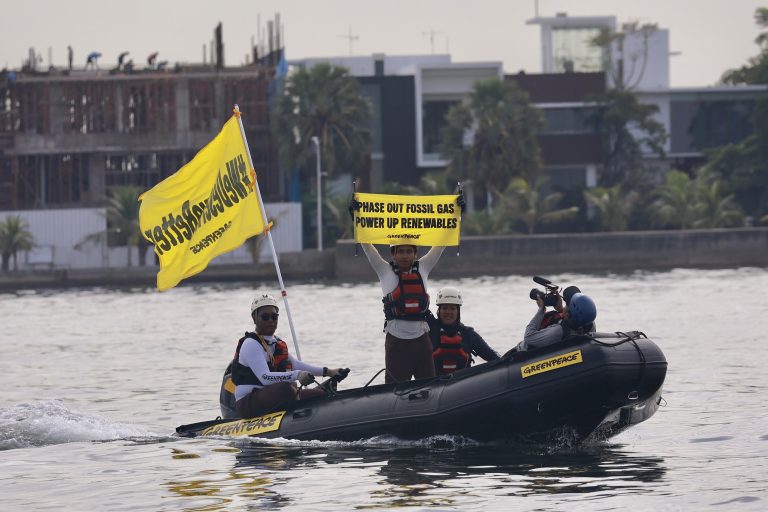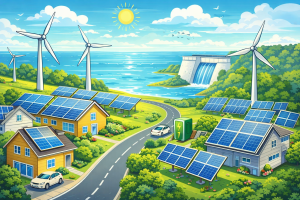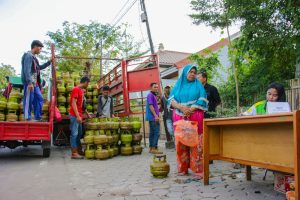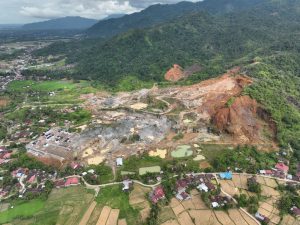Jakarta — As COP30 unfolds in Belém, Brazil, Greenpeace Indonesia staged a “red carpet for fossil lobbyists” protest at the Muara Karang gas power station in North Jakarta on 18 November, demanding an end to reliance on fossil fuels and more ambitious climate commitments from the Indonesian government. The action mocked what activists describe as Jakarta’s preferential treatment toward fossil fuel interests, symbolically rolling out a red carpet to highlight the presence of 46 fossil lobbyists inside Indonesia’s official COP30 delegation.
The protest underscored global criticism directed at Indonesia at this year’s climate talks. On 15 November, Indonesia was awarded the satirical Fossil of the Day title—an infamous COP tradition administered by Climate Action Network (CAN) International—given to countries deemed to be obstructing climate progress. This year, CAN accused Indonesia not only of welcoming fossil lobbyists to the negotiations but of allowing them to shape Indonesia’s official policy stance directly.

“The government’s massive reliance on fossil gas creates fundamental inconsistencies with Indonesia’s climate pledges and locks the country into decades of emissions,” said Greenpeace Indonesia climate campaigner Yuyun Harmono. Greenpeace, supported by CELIOS data, warns that the projected expansion of gas power by 22 GW could generate 49 million tons of CO₂ annually and nearly 44,000 tons of methane—far exceeding safe climate thresholds.
Indonesia’s renewable potential—estimated at 3,600 GW, including 3,200 GW of solar—remains largely untapped, with fossil fuels still projected to dominate more than 40% of the energy mix through 2034. “Energy transition must prioritise solar and wind—not shifting from coal to gas,” Yuyun said.
While Greenpeace staged its protest in Jakarta’s industrial corridor, concerns erupted simultaneously within negotiation rooms in Brazil. CAN International publicly labelled Indonesia “the worst example of corporate capture at COP30”, accusing its delegation of reproducing fossil industry language—“sometimes word for word”—in official country statements during discussions on Article 6.4 of the Paris Agreement, the carbon market mechanism.
According to CAN, Indonesia’s intervention aligned closely with positions circulated by fossil-linked groups, including Conservation International and the International Emissions Trading Association (IETA), whose board includes major oil and gas corporations. CAN notes that IETA alone brought 58 fossil lobbyists to COP30, contributing to the record-shattering 1,600 fossil lobbyists tracked by the Kick Big Polluters Out coalition—roughly one out of every 25 accredited participants.
This influence, CAN argues, directly undermines environmental integrity. Indonesia reportedly advocated for looser regulations on market oversight, weaker safeguards for high-risk nature-based offset projects. It reduced accountability measures—positions described as being “directly at odds with climate science.”
Critics fear that this corporate-shaped stance could weaken global carbon market rules, enabling polluters to continue emitting under the guise of offsetting. They also warn that Indonesia’s RUPTL 2025–2034—the national electricity plan—adds only 20–22 GW of renewables, still far below the 55–82% renewable share required by 2030 to follow a 1.5°C-aligned pathway.
For civil society groups, Indonesia’s Fossil of the Day dishonour is more than symbolic—it reflects an ongoing disconnect between climate diplomacy and national policy. While climate-vulnerable communities within Indonesia already grapple with floods, droughts, and rising heat extremes, activists argue that fossil-aligned policymaking dilutes ambition and delays transformative change.
The satirical award originated in Bonn in 1999 and has become a moral barometer of climate sincerity. This year, Indonesia stands out not only for enabling fossil lobby access—but for amplifying their agenda as state policy within the UN climate process, marking what CAN calls “a dangerous normalisation of fossil industry influence in international climate governance.” (Hartatik)
Banner photo: Greenpeace activists staged a peaceful protest at the Muara Karang Gas Power Plant (PLTGU) on Tuesday, November 18, 2025. (Source: Greenpeace)















